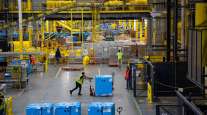Stocks Jump as Chinese President Xi Jinping Eases Tenion Over Tarriffs

NEW YORK — Stocks rose sharply on Wall Street on April 10 after Chinese President Xi Jinping said Beijing would reduce tariffs on imported cars and improve intellectual property protection, steps that could ease tensions with the United States.

Xi
Lower tariffs could mean better sales for U.S. car companies, while banks also could gain entry into the Chinese market. That sent automakers and financial companies higher.
Energy companies jumped along with the price of oil, a sign investors are getting more confident that the trade tensions won’t have a big effect on the global economy. Technology and industrial companies also rose.
“The market’s increasing expectation is that the two sides will sit down now,” said Paul Christopher, head of global market strategy for Wells Fargo Investment Institute. “There’s still a lot at stake because you have a global supply chain that could be interrupted because of tariffs.”
The S&P 500 index surged 44 points to 2,657. The Dow gained 429 points to 24,4068. The Nasdaq composite added 144 points to 7,094. The Russell 2000 index of smaller-company stocks advanced 31 points to 1,545.
Stocks had been on track for a similarly big jump April 9 before a late slump wiped out most of their gains. The Dow rose as much as 440 points during the day, but finished just 46 points higher.
Indexes overseas also climbed. Germany’s DAX jumped 1.1% and the British FTSE 100 gained 1%. The French CAC 40 gained 0.8%. Japan’s benchmark Nikkei 225 gained 0.5% and South Korea’s Kospi added 0.3% while Hong Kong’s Hang Seng added 1.7%.
Speaking at a business conference, Xi promised changes in areas that the United States has identified as priorities. He didn’t address other thorny topics including requirements for foreign companies to give technology to potential local competitors.
Technology and industrial companies have made some of the biggest swings on the market during the trade spat. If the United States and China both place tariffs on imports from the other, industrials face greater costs as well as with lower sales. Technology companies might face manufacturing changes and slower growth in the global economy.
So far the United States has proposed tariffs on at least $150 billion worth of products made in China, and China has said it could put tariffs on $50 billion in goods imported from the United States. Christopher, of Wells Fargo, said the United States still has a lot of leverage because it has mostly targeted products that are only partly assembled in China.
“The U.S., in the next round of tariffs, could start targeting goods that the Chinese do mostly produce themselves,” he said. That would cause China more economic pain.

Zuckerberg testifies during a joint Senate hearing. (Andrew Harrer/Bloomberg)
Facebook CEO Mark Zuckerberg is appearing before two Senate committees, and the company has started alerting some users that their data was swept up by Cambridge Analytica in the privacy scandal that has engulfed Facebook over the past four weeks. As many as 87 million users were affected.
Facebook shares have dropped sharply since the scandal emerged in March. They rose 2.1% to $161.24 on April 10.
Benchmark U.S. crude rose 3.3% to $65.51 a barrel in New York. Brent crude, used to price international oils, added 3.5% to $71.04 a barrel in London. Oil prices have bounced up and down recently as investors wonder if the trade dispute will hamper global economic growth.
Exxon Mobil added 3.7% to $77.62 and Marathon Oil jumped 5.3% to $17.21.
Wholesale gasoline rose 2.9% to $2.04 a gallon. Heating oil added 3.4% to $2.06 a gallon. Natural gas lost 1.4% to $2.66 per 1,000 cubic feet.
Gold rose 0.4% to $1,345.90 an ounce. Silver added 0.4% to $16.60 an ounce. Copper climbed 1.9% to $3.14 a pound.
VeriFone Systems surged after it agreed to be bought by Francisco Partners and British Columbia Investment Group. The investment group will pay $23.04 a share, or $2.54 billion, for VeriFone, which makes terminals for electronic payments. VeriFone stock climbed 52%, to $22.80.
Bond prices turned lower. The yield on the 10-year Treasury note rose to 2.80 % from 2.78 %.
The dollar climbed to 107.26 yen from 106.78 yen. The euro rose to $1.2353 from $1.2322.



